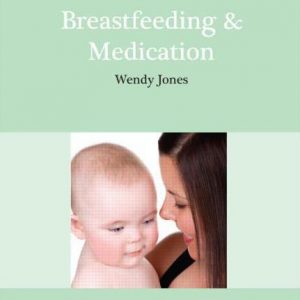71% of 500 women who responded to a PHE study, think breastfeeding will limit the medication which can be taken! So lots of work for me still to do then. Could professionals buy a copy of Breastfeeding and Medication to reassure women?
Statements like this on the NHS site arent going to help – more about manufacturer protecting themselves? Not taking risks? Could be better worded as it just isnt true. Breastfeeding mothers with depression get treated every day and their babies are fine!
“Breastfeeding: As a precaution, the use of antidepressants if you’re breastfeeding isn’t usually recommended. However, there are circumstances when both the benefits of treatment for depression (or other mental health conditions) and the benefits of breastfeeding your baby outweigh the potential risks. If you’re treated with antidepressants when breastfeeding, then paroxetine or sertraline is normally recommended.”
The Start for life page https://www.nhs.uk/start4life/breastfeedingto which the chat box https://www.messenger.com/t/Start4LifeBreastFeedingFriend/ links identifies the BfN Drugs in breastmilk helpine which I run as a resource. But they dont fund it – it is run on a voluntary basis and they didnt ask permission to see if I can deal with additional work. But I will keep doing my best to support mothers who need medication whilst breastfeeding

” Almost three-quarters of women in England start breastfeeding after giving birth but less than half are still doing so two months later, according to NHS and Public Health England data.
PHE recommends exclusive breastfeeding for the first six months, as does the World Health Organisation, because it boosts a baby’s ability to fight illness and infection. But a comparison of initial breastfeeding rates and those after six to eight weeks in the final quarter of 2015 found that they were 40% lower for the latter (44% compared with 73%).
A survey of 500 mothers commissioned by PHE found that fears about breastfeeding among women included that it could be painful (74%), prevent them taking medication (71%) and be embarrassing in front of strangers (63%).
The PHE’s chief nurse, Viv Bennett, said: “We can all help women feel comfortable breastfeeding their baby wherever they are. Creating a wider culture of encouragement and support will help make a mother’s experience all the more positive.”
PHE has launched an interactive breastfeeding friend chatbot, accessed through Facebook messenger, to provide personal support for breastfeeding 24 hours a day. Bennett said it would help women through the “crucial” initial period, after which things generally became easier.
A study published in the Lancet last year found the UK had the lowest rate of breastfeeding in the world, with only one in 200 women breastfeeding their children after they reach their first birthday.
The WHO recommends that breastfeeding form part of a baby’s diet up to two years of age. As well as reducing the likelihood of babies getting diarrhoea and respiratory infections, breastfeeding also lowers a mother’s risk of ovarian and breast cancer and burns about 500 calories a day.
The results, published on Thursday, suggested high-profile figures who promote breastfeeding can have a positive influence on other mothers. Just under half of respondents said the example of household names such as The Only Way is Essex star Sam Faiers, broadcaster Fearne Cotton and actor Blake Lively, who have recently championed breastfeeding on social media, had inspired them to do so themselves. About two-thirds (64%) said they felt more confident to breastfeed in public because of celebrity mums.
Other concerns raised by more than half of women were not being able to tell if their baby was getting enough or too much milk and that it could potentially place restrictions on the mother.
Jacque Gerrard, the director for England at the Royal College of Midwives, said: “Any initiative that goes towards helping mothers start and sustain breastfeeding for longer is positive as we know the health benefits from being breastfed last a lifetime.”